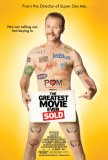Greatest Movie Ever Sold, The (United States, 2011)
April 21, 2011
It's probably a safe assumption that everyone reading this review is aware of the incestuous relationship that exists between advertising and movies. It's more than a company paying a fee to have a product appear on-screen; there's cross-marketing, mutual co-branding, and other ancillary benefits intended to create a "win-win" situation. Many in the industry feel that, without all its numerous corporate sponsors and the publicity that resulted from their involvement, Iron Man might not have become the mega-hit that it was. Morgan Spurlock's The Greatest Movie Ever Sold pulls back the curtain and reveals Oz. There's nothing surprising in what Spurlock uncovers, but it illustrates that everything we knew - or at least suspected - about the marriage between advertising and cinema is accurate.
The premise of The Greatest Movie Ever Sold is more intriguing than the execution. Considering what Spurlock is trying to do, it's unsurprising that he's unable to hit the proverbial home run, but he ends up with a solid single. His idea is to make a movie about movie advertising that is funded entirely by movie advertising. The production is an orgy of in-your-face product placements. And, while most of the movie is edited to represent a chronology of how Spurlock achieves the sponsorship he needs to fund the documentary and how he spends some of those funds on advertising and marketing of his own, he also includes three commercial breaks in which he shows "straight" advertisements for his three primary contributors. Of course, considering the context, these are amusing, but they generate laughter only because they have been deposited in the middle of a documentary in which we recognize they are a pre-arranged payoff. As stand-alone commercials, the tongue-in-cheek element would be lost.
Spurlock, whose Super Size Me generated as much buzz as any documentary not made by Michael Moore, knows how to hold an audience's attention even when his material is thin. In a way, this is a 90-minute gimmick, but Spurlock makes it entertaining. His contributions are evident both in front of the camera, where he's the star and driving force behind the "transparent" documentary, and behind it, where his editing takes hundreds of hours of footage and distills it into something resembling a linear storyline. Spurlock is clever and audacious.
A movie like this, especially when it preaches the doctrine of "transparency," gets one wondering exactly what was left on the cutting-room floor. How much sculpting and molding was needed for Spurlock to emerge with this particular take? A case could be made that The Greatest Movie Ever Sold works better as a comedy than as a documentary. One suspects the DVD is a "must see" as much as for the special features as for the film. Something of this nature needs to be a living, evolving entity in order for it to work. The home video version of The Greatest Movie Ever Sold should expand to include the theatrical reception.
The finished product contains some gems - such as the scene in which Spurlock interviews a high priced lawyer who quotes a fee then asks how much it's going to cost him to be seen in the movie. There are things that fall flat, chief of which is Spurlock's unconvincing moral dilemma about whether he's "selling out" or "buying in." Brett Rater, who is interviewed, doesn't seem the least bit bothered by the entwining of commerce and "art." Peter Berg, on the other hand, is struggling with it. Spurlock's resume doesn't indicate he's the kind of filmmaker who will undergo a crisis of conscience even in a situation as conflicted as this.
Some of the interviews are long-winded and certain segments stray off onto odd tangents. A good example of the latter is a trip Spurlock takes to Pittsburgh to learn about his "brand," which is muddily defined as "Playful/Mindful." Maybe the group making this determination paid money to be named in the film. The interview with Donald Trump doesn't yield much but it allows Spurlock to legitimately claim he has landed a "big" interview. Trump is, of course, a master self-promoter and is using Spurlock as calculatedly as the reverse is true.
The Greatest Movie Ever Sold invites us to watch for the product placements. It's almost a game and it can distract from the content of the interviews. Instead of listening to what Noam Chomsky was saying, I found myself staring at the bottle of POM Wonderful (the primary sponsor) on the table between Spurlock and Chomsky. A discussion between Spurlock and Ralph Nader turns into an advertisement for a shoe. And, since all competing beverages to POM are digitally blurred, that's something else to be on the lookout for.
An argument can be made that The Greatest Movie Ever Sold works on two levels. In the most basic sense, it's breezy, fun entertainment with a point to make. But the more one thinks about the way in which Spurlock has assembled the movie employing marketing and advertising, there's an almost dizzying sense of recursion. It's possible to question everything on screen and, without access to the entire archive of footage, those answers are not forthcoming. The Greatest Movie Ever Sold isn't as compelling as Super Size Me. However, its unique take on a common subject lends freshness to the familiar and provides a worthy motivation for seeing this.
Greatest Movie Ever Sold, The (United States, 2011)
Cast: Morgan Spurlock
Screenplay: Morgan Spurlock & Jeremy Chilnick
Cinematography: Daniel Marracino
Music:
U.S. Distributor: Sony Classics
U.S. Release Date: 2011-04-22
MPAA Rating: "PG-13" (Profanity, Brief Nudity)
Genre: DOCUMENTARY
Subtitles: none
Theatrical Aspect Ratio: 1.85:1
- Super Size Me (2004)
- (There are no more better movies of Morgan Spurlock)
- (There are no more worst movies of Morgan Spurlock)

Comments